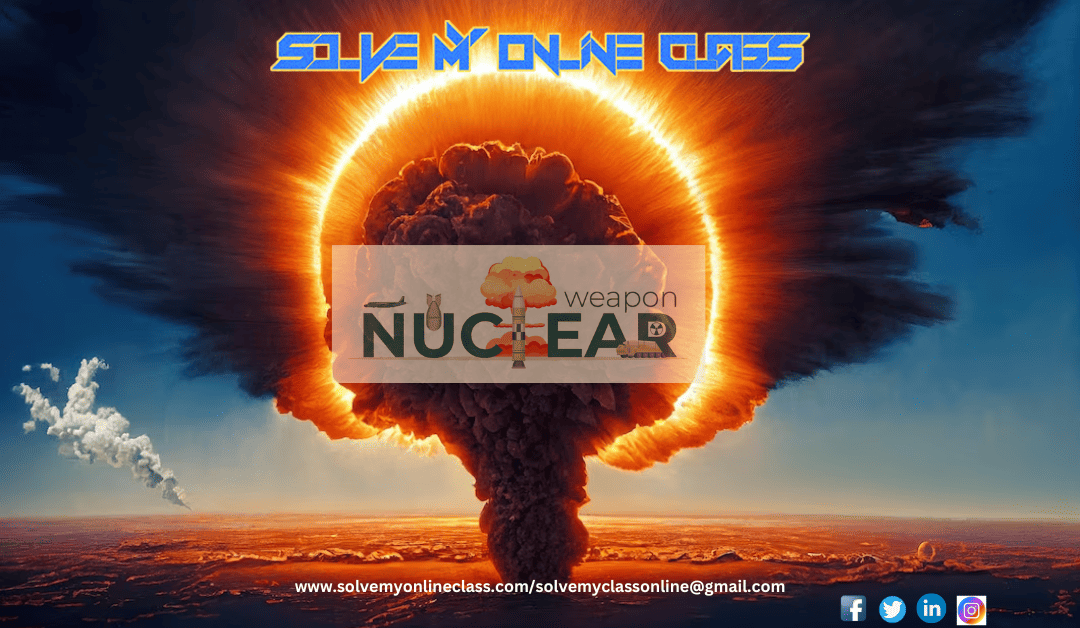The International Day for the Total Elimination of Nuclear Weapons serves as a harsh reminder of the urgent need to work towards a safer and more peaceful planet in a world scarred by wars and geopolitical tensions. This yearly commemoration, established by the UN, emphasizes the significance of a world free from the looming threat of nuclear annihilation. In this blog, we will examine the significance of this day as well as the potential and challenges associated with the pursuit of a nuclear-free planet.
The Danger of Nuclear War:
It is impossible to overestimate the deadly force of nuclear weapons. They have the power to do enormous damage on both our environment and human lives. Hiroshima and Nagasaki’s terrible histories serve as a chilling reminder of the horrors of nuclear warfare. Numerous people lost their lives, suffered acute and long-term health problems, and entire towns were destroyed as a result of the use of these weapons.
Nuclear weapons’ long-term effects are equally worrisome as their immediate effects. Radioactive contamination and the prospect for nuclear winter, a catastrophe when widespread flames and dust might send the earth into a new ice age, are two examples of the environmental consequences. These grave repercussions highlight how urgent it is to get rid of nuclear weapons.
the state of affairs at the moment:
Despite the fact that the world is aware of the risks presented by nuclear weapons, efforts to disarm have encountered several obstacles. To stop the spread of nuclear weapons and encourage disarmament, the Treaty on the Non-Proliferation of Nuclear Weapons (NPT) was signed in 1968. While there has been some progress in limiting the spread of nuclear weapons, disarmament has been made slowly.
The existence of nuclear arsenals in various nations continues to be a significant barrier. Nations believe that these weapons act as deterrents against prospective threats, leading to the paradoxical situation where they assert that they are maintaining peace yet possessing weapons that might cause enormous harm. Such arsenals present a constant risk because to the possibility of accidents, errors in judgment, or unlawful use. cause a devastating worldwide catastrophe.
Initiatives for Disarmament:
Despite the significant obstacles, there have been measurable advancements in nuclear disarmament. A huge step in the right direction was taken with the adoption of the Treaty on the Prohibition of Nuclear Weapons (TPNW) in 2017. The development, testing, production, purchase, possession, stockpiling, transfer, use, and threat of use of nuclear weapons are all prohibited under this treaty. It makes a strong statement about how determined most countries are to get rid of these weapons.
The TPNW’s lack of membership by significant nuclear-armed powers, such as the United powers and Russia, emphasizes the gap between nuclear-armed and non-nuclear-armed countries. For serious disarmament progress, this gap must be closed.
How Important Diplomacy Is:
In order to achieve a nuclear-free world, diplomacy and communication are essential strategies. History has demonstrated that diplomatic efforts and open communication can result in agreements that lower nuclear arsenals. A successful example of diplomacy in action is the Strategic Arms Reduction Treaty (START) between the United States and Russia. These agreements offer openness and checkpoints to assure compliance, lowering the possibility of unintentional conflict.
Additionally, conversation promotes international trust and offers chances for conflict settlement. Diplomatic initiatives can aid in paving the road for disarmament by addressing the underlying security issues that drive the development of nuclear weapons.
Role of Civil Society:
The cause of nuclear disarmament is advanced significantly by civil society, which is independent of national and international institutions. Around the world, grassroots movements, advocacy organizations, and concerned citizens have played a crucial role in bringing attention to the dangers of nuclear weapons and driving for action.
The International Campaign to Abolish Nuclear Weapons (ICAN) winning the Nobel Peace Prize in 2017 is evidence of the effectiveness of the efforts of civil society. ICAN’s tireless advocacy for the TPNW serves as an example of how people and groups may affect change on a global scale.
Conclusion:
We must consider the urgent necessity to give the pursuit of international security top priority on the International Day for the Total Elimination of Nuclear Weapons. Nuclear weapons are an existential menace to both humanity and the environment. Despite ongoing difficulties, diplomatic initiatives, global agreements, and civil society involvement give hope for a world free of these devastating weapons.
We have a responsibility as global citizens to support disarmament efforts and keep our leaders responsible for their pledges to a nuclear-weapons-free world. Together, we can make the idea of a nuclear-weapons-free world a reality, ensuring a safer and more peaceful future for future generations.




